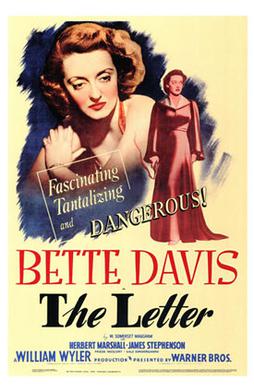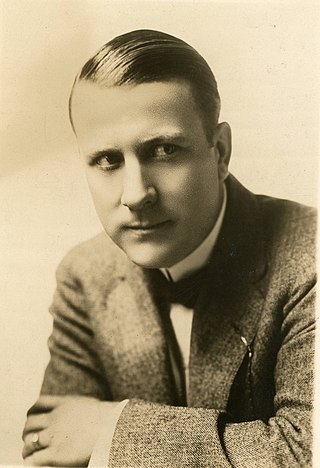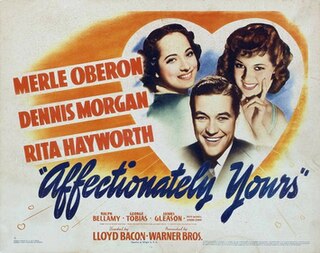
Dark Victory is a 1939 American melodrama film directed by Edmund Goulding, starring Bette Davis, and featuring George Brent, Humphrey Bogart, Geraldine Fitzgerald, Ronald Reagan, Henry Travers, and Cora Witherspoon. The screenplay by Casey Robinson was based on the 1934 play of the same title by George Brewer and Bertram Bloch, starring Tallulah Bankhead.

William Wyler was a German-born American film director and producer. Known for his work in numerous genres over five decades, he received numerous awards and accolades, including three Academy Awards. He holds the record of twelve nominations for the Academy Award for Best Director. For his oeuvre of work, Wyler was awarded the Irving G. Thalberg Memorial Award, the Directors Guild of America Lifetime Achievement Award, and the American Film Institute Life Achievement Award.

Roman Holiday is a 1953 American romantic comedy film directed and produced by William Wyler. It stars Audrey Hepburn as a princess out to see Rome on her own and Gregory Peck as a reporter. Hepburn won an Academy Award for Best Actress for her performance; the film also won the Academy Award for Best Story and the Academy Award for Best Costume Design.

Eldred Gregory Peck was an American actor and one of the most popular film stars from the 1940s to the 1970s. In 1999, the American Film Institute named Peck the 12th-greatest male star of Classic Hollywood Cinema.

The Letter is a 1940 American crime film noir melodrama directed by William Wyler, and starring Bette Davis, Herbert Marshall and James Stephenson. The screenplay by Howard E. Koch is based on the 1927 play of the same name by W. Somerset Maugham derived from his own short story. The play was first filmed in 1929, by director Jean de Limur. The story was inspired by a real-life scandal involving the Eurasian wife of the headmaster of a school in Kuala Lumpur who was convicted in a murder trial after shooting dead a male friend in April 1911. She was pardoned by the local sultan after a public furor.

Muriel Teresa Wright was an American actress. She won the 1942 Academy Award for Best Supporting Actress for her role as Carol Beldon in Mrs. Miniver. She was nominated for the same award in 1941 for her debut work in The Little Foxes. Also in 1942, she received a nomination for the Academy Award for Best Actress for her performance in The Pride of the Yankees, opposite Gary Cooper. She is also known for her performances in Alfred Hitchcock's Shadow of a Doubt (1943), and in William Wyler's The Best Years of Our Lives (1946).

George Gaynes was a Dutch-American singer, actor, and voice artist. Born to Dutch and Russian-Finnish parents in the Grand Duchy of Finland of the Russian Empire, he served in the Royal Netherlands Navy during World War II, and subsequently emigrated to the United States, where he became a citizen and began his acting career on Broadway.

William King Baggot was an American actor, film director and screenwriter. He was an internationally famous movie star of the silent film era. The first individually publicized leading man in America, Baggot was referred to as "King of the Movies," "The Most Photographed Man in the World" and "The Man Whose Face Is As Familiar As The Man In The Moon."

The Joan Crawford filmography lists the film appearances of American actress Joan Crawford, who starred in numerous feature films throughout a lengthy career that spanned nearly five decades.

Way Back Home is a 1931 American Pre-Code drama film directed by William A. Seiter and starring Phillips Lord, Effie Palmer, Frank Albertson, and Bette Davis. The screenplay by Jane Murfin is based on characters created for the NBC Radio show Seth Parker by Phillips Lord.

Ex-Lady is a 1933 American pre-Code comedy/drama film directed by Robert Florey. The screenplay by David Boehm is a remake of the Barbara Stanwyck film Illicit (1931), both crediting a story by Edith Fitzgerald and Robert Riskin. The film focuses on a pair of lovers, commercial illustrator Helen Bauer and advertising writer Don Peterson, who have been living together quite happily for some time. One night, after hiding in Helen's bedroom until their party guests have all left, Don announces that he is tired of sneaking around. He wants marriage—and possibly children—and Helen finally agrees, although she is afraid that it will wreck their relationship. Her predictions of trouble—increased by the stresses of opening their own advertising agency—come true, but in the end, with the serendipitous intervention of their perpetually inebriated friend, Van, they reconcile and resume the mixed blessings of wedded bliss.
The Judge and Jake Wyler is a 1972 American TV movie directed by David Lowell Rich. The teleplay was written by Richard Levinson, William Link, and David Shaw. It was produced by Universal Television and broadcast by NBC on December 2, 1972.

The Little Foxes is a 1941 American drama film directed by William Wyler. The screenplay by Lillian Hellman is based on her 1939 play The Little Foxes. Hellman's ex-husband Arthur Kober, Dorothy Parker and her husband Alan Campbell contributed additional scenes and dialogue.

The Good Fairy is a 1935 romantic comedy film written by Preston Sturges, based on the 1930 play A jó tündér by Ferenc Molnár as translated and adapted by Jane Hinton, which was produced on Broadway in 1931. The film was directed by William Wyler and stars Margaret Sullavan, Herbert Marshall, Frank Morgan and Reginald Owen.

Audrey Hepburn (1929–1993) was a British actress who had an extensive career in film, television, and on the stage. Considered by some to be one of the most beautiful women of all time, she was ranked as the third greatest screen legend in American cinema by the American Film Institute. Hepburn is also remembered as both a film and style icon. Her debut was as a flight stewardess in the 1948 Dutch film Dutch in Seven Lessons. Hepburn then performed on the British stage as a chorus girl in the musicals High Button Shoes (1948), and Sauce Tartare (1949). Two years later, she made her Broadway debut as the title character in the play Gigi. Hepburn's Hollywood debut as a runaway princess in William Wyler's Roman Holiday (1953), opposite Gregory Peck, made her a star. For her performance, she received the Academy Award for Best Actress, the BAFTA Award for Best British Actress, and the Golden Globe Award for Best Actress in a Motion Picture – Drama. In 1954, she played a chauffeur's daughter caught in a love triangle in Billy Wilder's romantic comedy Sabrina, opposite Humphrey Bogart and William Holden. In the same year, Hepburn garnered the Tony Award for Best Actress in a Play for portraying the titular water nymph in the play Ondine.

Hollywood Cavalcade is a 1939 American film featuring Alice Faye as a young performer making her way in the early days of Hollywood, from slapstick silent pictures through the transition from silent to sound.

Affectionately Yours is a 1941 American romantic comedy film directed by Lloyd Bacon and starring Merle Oberon, Dennis Morgan, and Rita Hayworth. It was produced and distributed by Warner Brothers. Bette Davis was originally intended for the lead role but was replaced by Oberon.

Straight Shootin' is a 1927 American silent Western film directed by William Wyler. It is a silent five-reel Western released by Universal Pictures as part of their Blue Streak Series.

Eve Knew Her Apples is a 1945 musical comedy remake of the 1934 film It Happened One Night directed by Will Jason and starring Ann Miller, William Wright and Robert Williams. The movie was produced and distributed by Columbia Pictures, owner of the rights to the original 1934 version, and would be remade as a musical comedy again in 1956 as You Can't Run Away from It with June Allyson and Jack Lemmon.
Harry Marker was an American Oscar-nominated film editor, who also worked in the television medium. Over the course of his 45-year career, he worked on more than 100 films and television shows. In 1946 he was nominated for an Oscar for Best Film Editing for The Bells of St. Mary's.


















